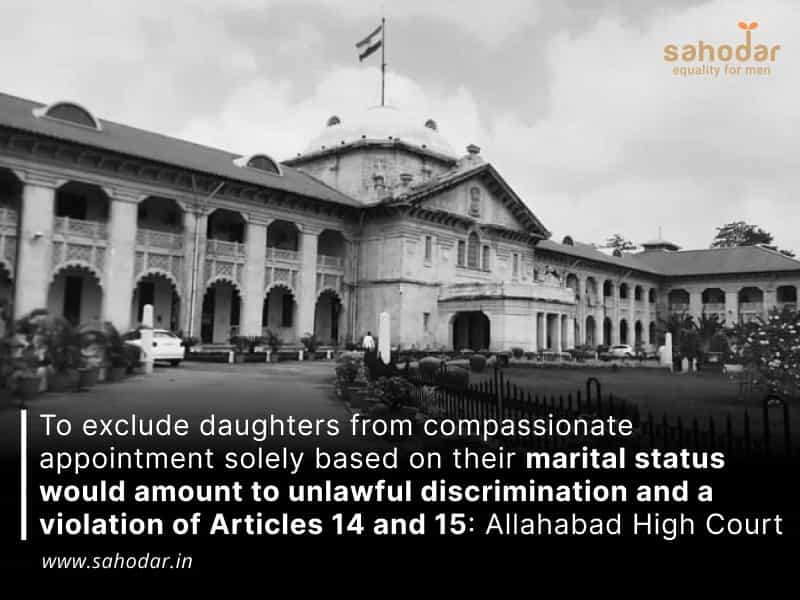The Allahabad High Court has recently declared that the act of denying compassionate appointment to daughters based solely on their marriage status would be considered discriminatory and in violation of Articles 14 and 15.
Justice Alok Mathur’s bench addressed a petition challenging the rejection of the petitioner’s claim for appointment under the Dying in Harness Rules by the Secretary of the Uttar Pradesh Cooperative Institutional Services Board in Lucknow. The petitioner’s father, Sunil Kumar Mishra, had passed away during his service as a Class IV employee in the District Cooperative Bank on January 7, 2021, leaving behind his widow and the petitioner. The petitioner, a married woman, is living with her mother, who is suffering from cancer, and taking care of her. In the wake of her father’s sudden death, the family is facing financial difficulties, prompting the petitioner to apply for compassionate appointment under Regulation 104 (V) of the Uttar Pradesh Cooperative Society Employees’ Service Regulation 1975 on March 1, 2021.
The Bank Managing Committee had reviewed the petitioner’s case, but it was ultimately denied through the contested order. The sole basis for the rejection was that the petitioner, a married daughter of the deceased employee, did not fall under the definition of “family” as stated in the note attached to Rule 104 of the 1975 Regulations.
The bench cited the case of Smt. Vimla Srivastava vs. State of U.P. and others, in which a comparable provision from the Uttar Pradesh Dying in Harness Rules, 1974 was challenged before a Division Bench of the court. In that case, the definition of “family” did not include married daughters. However, the court deemed the provision unconstitutional and arbitrary, and ruled that married daughters should be included within the definition of “family” as per the explanation provided.
The High Court stated that the ruling in the Vimla Srivastava case is relevant to the current case. The definition of “family” in the Dying in Harness Rules, 1974 is similar to the Note attached to Regulation 104 of the 1975 Regulations. The definition includes daughters but excludes married daughters, which the court deemed to be inconsistent with the Constitution.
The bench rejected the notion that a daughter, after getting married, is no longer considered a member of her father’s family or dependent on him, regardless of social circumstances. In cases of compassionate appointments, the determination of dependency is based on specified relationships. There may be instances where a deceased government servant’s son may not require compassionate appointment due to the financial position of the family. However, the decision regarding dependency is not based on whether the son is married or not.
The High Court added that the eligibility of a deceased government servant’s daughter for compassionate appointment should be determined based on whether she was dependent on the deceased, after taking into account all relevant factors and circumstances. The exclusion of daughters from consideration solely based on their marriage would be considered discriminatory and a violation of Articles 14 and 15 of the Constitution.
The bench concluded that the exclusion of married daughters from the definition of “family” in the Note attached to subclause (V) of Regulation 104 of the 1975 Regulations is illegal, unconstitutional, and a violation of Articles 14 and 16 of the Constitution of India. As a result, the court invalidated the use of the word “unmarried” in the Note. Consequently, the High Court granted the petition.
Source: https://lawtrend.in/excluding-daughters-for-compassionate-appointment-purely-on-the-ground-of-marriage-would-constitute-impermissible-discrimination-and-be-violative-of-articles-14-and-15-allahabad-hc/

